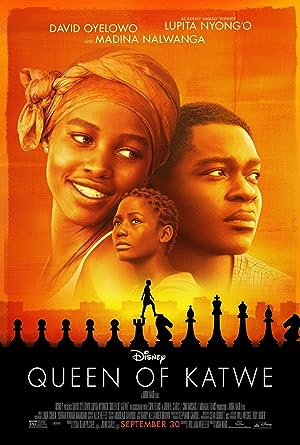After seeing a preview for Queen of Katwe, I was not planning on seeing it in theaters. Queen of Katwe felt like it was going to be predictable and was a Disney film. Sure Mira Nair directed and Lupita Nyong’o and David Oyelowo starred in Queen of Katwe, but that didn’t mean it was going to be good, did it? And Hollywood is already casting Lupita as a mother! Ugh!
What changed my mind? When Queen of Katwe was in theaters, the controversy about rapey Nate Parker’s Birth of a Nation abounded with many black people ringing the solidarity bell to see the movie, which I was not going to pay money to see. I don’t care how amazing a movie is alleged to be. I don’t pay to see Woody Allen or Roman Polanski films or films starring Casey Affleck.
I listen to The Black Guy Who Tips podcast, and the hosts, Rod and Karen, made an excellent point. No one was ringing the bell for black solidarity to see other films like Queen of Katwe and Moonlight. There are amazing black stories being told, and some of those stories are about black girls and gay black men. What makes those stories less important than a man’s? I changed my tune and began desperate to throw my credit card at the nearest theater before Queen of Katwe left. By the way, a film directed by Mira Nair and starring Nyong’o and Oyelowo is going to be good! Duh! I am so glad that I saw Queen of Katwe and recommend that literally everyone see this excellent film.
Queen of Katwe is an adaptation of a biography about Phiona Mutesi, a Ugandan chess champion who has the title of Woman Candidate Master. Queen of Katwe depicts Phiona’s journey from selling food in the street market to competing in world championships while still trying to survive daily life in the slums of her hometown. Honestly the plot summary of Queen of Katwe does not do it justice. Queen of Katwe is so much more than the unlikely poor kid does well and becomes a champion.
First, Queen of Katwe fully represents each character fairly and as fully human three-dimensional characters, not just the titular character. Phiona’s teacher, played by Oyelowo has dreams, a life and concerns before and during his time with Phiona. He does not solely exist to help her become great. Her mother, played by Nyong’o, is a woman of pride and expertise who imagined that her life would be so different than her life now and is on guard against the different pitfalls that could befall her children while simultaneously and painfully aware that she is powerless to prevent them in her own life. Phiona’s siblings and fellow chess buddies are complete individuals with different advantages and obstacles from Phiona, but they are all children who are learning about their place in the world and are in danger of either retreating in fear or moving forward in confidence to face it. Queen of Katwe treats every one with a lot of respect and never loses sight of the fact that these are not characters on the page or the screen, but real people whose story is still unfolding and are still fighting the good fight. Stay for the credits!
Second, I know nothing about chess, and a movie about playing chess does not sound riveting, but it was. Queen of Katwe uses chess as a metaphor for life and how you can transform yourself depending on how you choose to move forward and avoid traps by looking ahead. I know some reviewers found this metaphor heavy-handed, but I loved it.
Third, Queen of Katwe’s characters are all black and Christian, but there is still class, regional and gender prejudice that creates barriers to opportunities. Can anything good come out of Katwe? Phiona and her family are the poorest people that I have seen depicted in film in the twentieth and twenty-first century. Phiona and her family are even considered poor by her slum’s standards. People don’t want her to come to chess club for practical reasons. She smells. Then the regional chess community creates financial obstacles to any of the Katwe children competing, but they would rather that they don’t come at all. Katwe children do not have uniforms and are not bourgeois enough for their tastes. Finally because Phiona is a girl, it is assumed that she can’t play. There are numerous barriers to being accepted or welcomed, and these barriers could mean life or death. They are not just theoretical or academic.
Fourth, Queen of Katwe has an international feel. The United States is never a part of the film. Queen of Katwe unfolds in Uganda then briefly moves to different locations such as Russia, but it just isn’t about US, and that was refreshing to get a perspective outside of my own.
Finally, Queen of Katwe tackles the dissatisfaction that comes with accomplishment and knowledge. Before chess, she was poor, but happy. After chess, she can see the world and what life can be like, but she is still impoverished and in danger. Most movies about disadvantaged children who achieve excellence do not tackle what happens after the victory. Queen of Katwe addresses Phiona’s anger without dismissing it or letting it diminish her as a person. Her anger and frustration is justified and not easily solved.
Disney is bringing the heat and revamping its image. Don’t let the Disney label dissuade you from seeing Queen of Katwe. Disney is becoming a stamp of international excellence. People of all ages and nationalities, particularly if you face seemingly insurmountable odds, will feel inspired, not manipulated, by Queen of Katwe.





